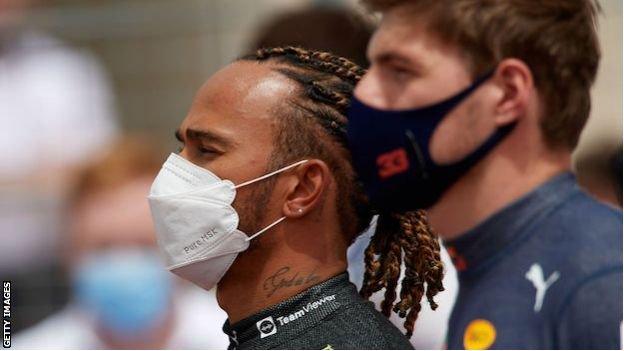Sao Paulo Grand Prix: Lewis Hamilton disqualified from qualifying, Max Verstappen fined 50,000 euros
- Published

Lewis Hamilton trails Max Verstappen by 19 points in the drivers' championship with four races to go
Lewis Hamilton has been disqualified from qualifying at the Sao Paulo Grand Prix for a technical infringement on his Mercedes car.
The rear wing on his Mercedes was found to contravene rules after he set pole position for Saturday's 'sprint' event.
It means Hamilton will start the 'sprint' from last place, with title rival Max Verstappen on pole.
In a separate verdict, Verstappen was fined 50,000 euros for touching Hamilton's car after qualifying.
That fine equates to £42,700.
The decision to penalise Hamilton is a potentially major blow to his title hopes as the season heads towards its climax.
Hamilton trails Verstappen by 19 points in the World Championship with four races and a maximum of 107 points available.
The Briton also has a five-place grid penalty for the main grand prix after Mercedes fitted a new engine to his car. It was his fifth of the season, when the maximum allowed is three.
If Verstappen scores at least five points more than Hamilton this weekend, the Dutchman will be able to finish second behind the seven-time champion at all three remaining races and still win his first world title.
The 'sprint' - a short race about one third the distance of a grand prix - sets the grid for Sunday's main event and awards a small number of points to the top three.
There are three points for the winner of the sprint, two for the driver in second and one for third.
What was wrong with Hamilton's car?
Hamilton's car was referred to the stewards after he had set a fastest lap that was 0.438 seconds quicker than Verstappen in Friday's qualifying session.
The move came after Red Bull lodged a complaint with governing body the FIA about Hamilton's rear wing.
Officials inspected the wing and found that it did not comply with the rules regarding the maximum gap between its two elements when the DRS overtaking aid was deployed.
The DRS operates the upper flap of the rear wing, lifting it up on specified parts of the lap to reduce drag and increase straight-line speed.
The gap was measured to be larger at the outer sections of the wing than the maximum permitted distance of 85mm.
Mercedes argued that the design was intended to meet the rules, and the stewards said they were "satisfied that the design meets the intent of the regulation" and there was "no question… of any intent to exceed the maximum dimension either by action or design".
It was clear, the stewards said, that the extra gap was caused by additional play in either the DRS activator or pivots, "or some combination or other fault with the mechanism or incorrect assembly of parts".
The stewards accepted Mercedes' argument that the problem was that "something [had] gone wrong" but ruled that Hamilton had to be disqualified because the parts did not comply with the rules.
Why was Verstappen punished?
Verstappen's offence occurred when he went over to look at Hamilton's car after qualifying, when the two had pulled up in what is known as parc ferme, because Red Bull had questions about the Mercedes' rear wing.
Stewards said it was clear "that there was insignificant force when Verstappen touched the wing".
And they added that Verstappen's actions had "no bearing" on the problem with Hamilton's wing.
The stewards accepted that it had "become a habit of drivers to touch cars after qualifying and races" - a point Verstappen made to them.
But they added: "This general tendency has been seen as mostly harmless and so has not been uniformly policed.
"Nevertheless, it is a breach of the parc ferme regulation and has significant potential to cause harm."
The stewards added that further similar offences "may incur different penalties".

The Nuremberg Trials: The remarkable aftermath of the verdict on the Nazi war criminals
From prison to president: Mohamed Nasheed is fighting for his island
